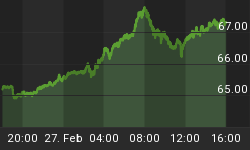On February 24, Reuters reported that the Reserve Bank of India was "set to be a buyer" of the 191.3 tonnes (6.74 million ounces) of gold the IMF is selling. Although the bank wouldn't comment directly on the possibility, they did say, "We are closely looking at the gold market... gold is a safe bet."
The article then quoted an unidentified official from the China Gold Association as saying, "It is not feasible for China to buy the IMF bullion, as any purchase or even intent to do so would trigger market speculation and volatility."
But the next day, Finmarket news agency in Russia reported that China "confirmed its intention" to buy the IMF gold. "Chinese officials have confirmed previous announcements from IMF experts and said that the purchasing of 191 tons of gold would not exert negative influence on the world market."
While they've been silent since, both India and China have publicly hinted they want this latest batch of yellow bars from the IMF. There's no way to know if a competitive bid would spring up between these two countries, but...can you imagine the ramifications if one did?
When India bought 200 tonnes of IMF gold last November 3, it set off a buying spree that saw gold rise 14.2% in 4 weeks. What if this time around, a couple central banks both want the gold for sale? What if China says to India, "Not so fast, guys. We'd like to bid on that, too..." and word of that clash leaked out?
Pure speculation, of course, but competing for gold purchases isn't a far-fetched idea. This sale is not pre-arranged; it's an open market sale. Also, there's only so much to go around. These two countries have only a tiny amount of their reserves in gold. Throw in the fact that central banks worldwide are already net buyers.
A pretty delicious thought, wouldn't you say?
The gold price dropped a tad on the IMF announcement, but is up 1.1% since then. It's pretty hard to make a case that IMF sales will hurt the gold price. As I said a few weeks ago in my dirty jokes column, IMF sales tend to mark bottoms in the price and not tops. The World Gold Council reported that floor traders now consider $1,054 as a floor in the market. Why? That was the average price India paid for the 200-tonnes they bought from the IMF last fall.
Meanwhile, what is our government doing?

You'll recall that that big spike in the U.S. monetary base in late 2008 was never before seen in history. The Federal Reserve basically doubled it overnight. Our economist Terry Coxon described it as "beyond unprecedented."
So, they stopped that insane activity, right? Since December 2008, the monetary base has swelled from 1.69 trillion to 2.18 trillion, a 29% increase and another new record.
Printing paper money vs. buying physical gold. I don't know about you, but I think I'll follow China and India's lead here, even if I have to compete for the price I pay for my gold.
Is $1054 really the bottom in the gold price? Check out our 4 clues in the current issue of Casey's Gold & Resource Report here risk free.















